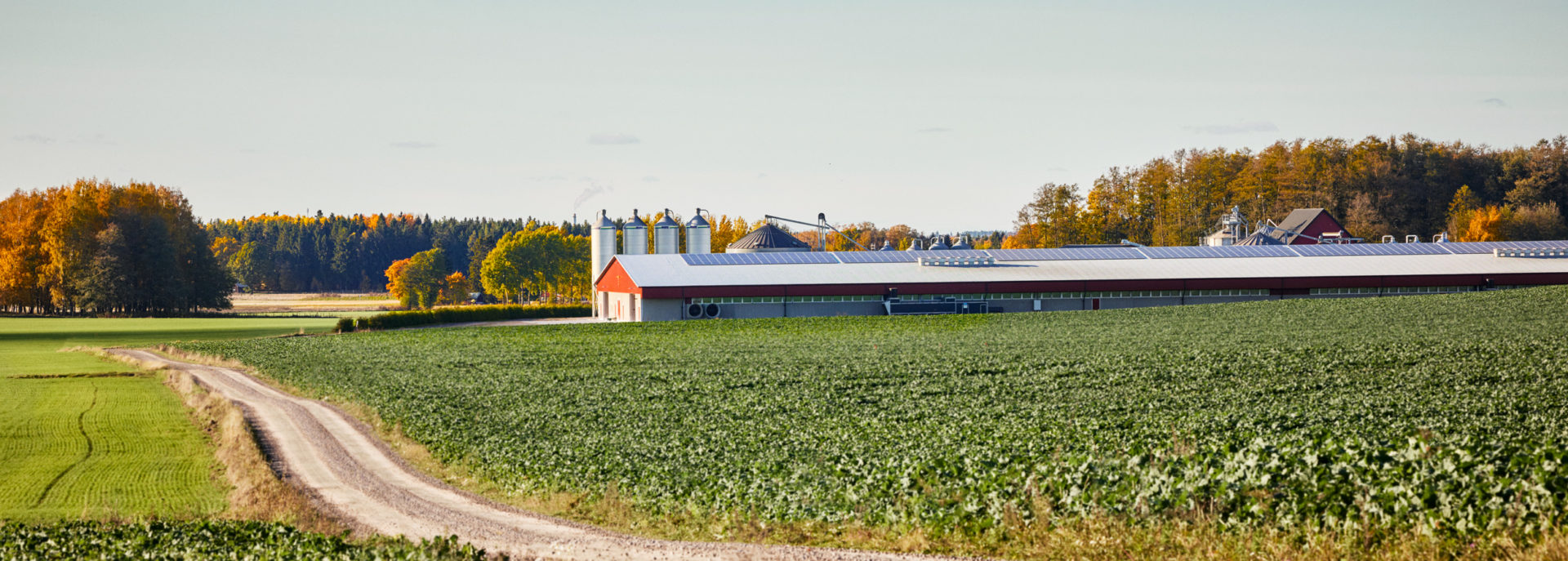
Climate – farm-to-fork
The climate is one of the most critical matters of our time, and we need to help reduce emissions and identify and manage the risks resulting from climate change. At the same time, we regard the increased efforts to reduce society’s climate impact as an opportunity for chicken to be part of the solution by being a climate-friendly source of protein.
Scandi Standard’s operations in the value chain divided by country

Feed production
|

Parent bird breeding
|

Hatching
|

Rearing
|

Slaughtering
|

Processing and packaging
|

Distribution
|

Sales
|
|
|---|---|---|---|---|---|---|---|---|
| Sweden | ||||||||
| Denmark | ||||||||
| Norway | ||||||||
| Ireland | ||||||||
| Finland | ||||||||
| Lithuania | ||||||||
| 78% | 1% | 1% | 5% | 4% | 11% | |||
| Approximate distribution of Scandi Standard’s carbon-dioxide emissions in per cent distributed by the eight steps of the value chain. | ||||||||
Science-based targets
The Science Based Targets Initiative (SBTi) drives ambitious climate action in the private sector by enabling organizations to set science-based emissions reduction targets. As one of few Swedish food producers, Scandi Standard’s climate targets were approved by the Science Based Target initiative during 2023 and updated and approved again in 2024.
Climate targets
| Short-term targets (2030) | Long-term targets (2050) | |||
| Scope 1 and 2 | Scope 3 | Scope 1 and 2 | Scope 3 | |
| Emissions from energy and industry (Non-FLAG) | 42% reduction of absolute emissions compared with the base year 2021 | 42% reduction of absolute emissions compared with the base year 2021 | 90% reduction of absolute emissions compared with the base year 2021 | 90% reduction of absolute emissions compared with the base year 2021 |
| Emissions to Forest, Land and
Agriculture (FLAG1) Includes land use and land management changes |
30.3% reduction of absolute emissions compared with the base year 2021 | 30.3% reduction of absolute emissions compared with the base year 2021 | 72% reduction of absolute emissions compared with the base year 2021 | 72% reduction of absolute emissions compared with the base year 2021 |
We have set short-term industrial and energy targets together with FLAG emission reduction targets for entire Group as well as for individual companies within the Group. These targets encompass all emissions, including those linked to land management and land use changes. The targets are aligned with the Paris Agreement goal to limit global warming to 1.5°C. The Science Based Targets initiative validated our short-term targets for the entire Group in November 2024 and approved our long-term targets. Alongside the overall emissions targets, we have set additional targets that focus on different parts of our value chain. These include packaging, water, food waste and biodiversity, among others.
1Forest, Land and Agriculture
Climate change mitigation
A priority for Scandi Standard is the systematic integration of sustainability into strategy and operations based on our 2030 sustainability goals. This entails work by Scandi Standard both at the Group level and in each country to develop specific action plans to achieve local and Group-wide goals.
We are acting to reduce our climate impact at every stage of our value chain. In 2021 and 2022, we calculated the carbon footprint at the product level for 282 products in all of Scandi Standard’s domestic markets. Together with the Carbon Trust, a customized model for Scandi Standard’s value chain has been developed pursuant to the PAS 2050 standard. These calculations have been third-party verified.
A process to update product-level carbon dioxide calculations to ensure that the best available data is used was launched in 2024 and is expected to be completed in 2025.
Energy consumption
Scandi Standard’s production sites undertake work to ensure efficient energy use. The basis of these efforts is the Group’s environmental policy and local targets. We work systematically to map efficiency and take actions related to energy optimization, such as recirculating heat and changing to energy-efficient LED lighting. We are also working on the gradual phase-out of fossil energy sources. All electricity purchased for our production plants is renewable with energy attribute certificates.
Logistics and transport
We strive for efficient transport solutions with the least possible impact on the climate. We require our transport suppliers to observe our Supplier Code of Conduct, provide us with environmental data, and use EURO 6 environmentally classified vehicles. Currently, more than 90 percent provide us with emissions data, and we are working continuously to raise this percentage and decrease our environmental impact from transportation.
Climate Transition Plan
Scandi Standard’s Climate Transition Plan is a comprehensive and time-bound action plan designed to support the company’s overall strategy and ambitious science-based climate targets validated by the Science Based Targets Initiative (SBTi). Energy efficiency and the transition to renewable energy sources are key elements of the company’s strategy.